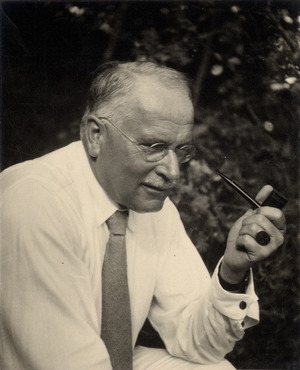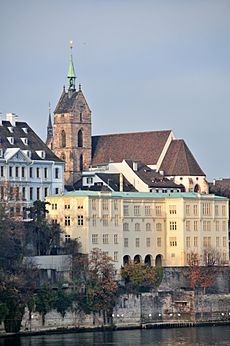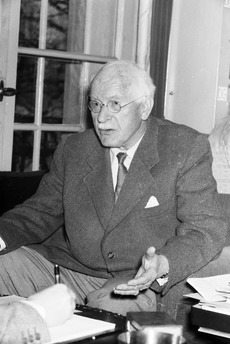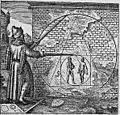Carl Jung facts for kids
Quick facts for kids
Carl Jung
|
|
|---|---|
 |
|
| Born |
Carl Gustav Jung
26 July 1875 Kesswil, Thurgau, Switzerland
|
| Died | 6 June 1961 (aged 85) Küsnacht, Zürich, Switzerland
|
| Alma mater | |
| Known for |
|
| Spouse(s) | |
| Children | 5 |
| Relatives | Karl Gustav Jung (grandfather) |
| Awards |
, Fordham University , Harvard University , University of Allahabad , University of Benares , University of Calcutta , University of Oxford and University of Geneva
|
| Scientific career | |
| Fields | |
| Institutions |
|
| Doctoral advisor | Eugen Bleuler |
| Influences |
|
| Influenced |
|
| Signature | |
 |
|
Carl Gustav Jung (yuung; 26 July 1875 – 6 June 1961) was a famous Swiss psychiatrist and psychoanalyst. He created a special way of understanding the human mind called "analytical psychology." Many people believe he is one of the most influential psychologists ever.
Jung's ideas have been very important in many areas. These include psychiatry (studying mental health), anthropology (studying human societies), archaeology (studying ancient cultures), literature, philosophy, psychology, and religious studies.
Contents
Biography
Early Life and Family
Carl Gustav Jung was born on July 26, 1875, in Kesswil, Switzerland. He was the first son to survive in his family. His father, Paul Jung, was a pastor in the Swiss Reformed Church. Carl's grandfather, also named Karl Gustav Jung, was a well-known professor of medicine.
Carl's mother, Emilie Preiswerk, came from a large family with deep Swiss roots. She was sometimes withdrawn and had unusual beliefs. Carl felt a closer connection with his father.
When Carl was six, his family moved to Laufen, where his father got a better church job. Carl's sister, Johanna Gertrud, was born when he was nine. She later became his secretary.
University and Career Beginnings

At first, Jung thought about becoming a preacher like his father. He also wanted to study archaeology. However, his family could only afford for him to attend the University of Basel, which did not offer archaeology. After studying philosophy, he decided to focus on psychiatry and medicine instead of a religious path.
In 1895, Jung began studying medicine at the University of Basel. His father passed away about a year later, leaving the family with little money. Relatives helped Jung continue his studies.
In 1900, Jung moved to Zürich and started working at the Burghölzli psychiatric hospital. There, he worked under Eugen Bleuler, who introduced him to the ideas of Sigmund Freud. Freud was developing a new field called "psycho-analysis." Jung became a strong supporter of Freud's new ideas.
Working with Sigmund Freud
Freud was looking for people to help him develop and share his ideas. Jung's research had already gained him international attention. In 1906, Jung sent Freud a copy of his book, Studies in Word Association.
Jung and Freud met for the first time in Vienna in March 1907. They talked for 13 hours straight! This meeting began a close friendship and working relationship that lasted for six years.
However, Jung and Freud eventually had different ideas about psychology. These differences grew, and in 1912, Jung published his book The Psychology of the Unconscious. This book showed how much his ideas differed from Freud's. Their disagreements led to a final break in their friendship. Jung felt very hurt by this. Most of his friends and colleagues stopped supporting him.
Exploring the Unconscious Mind
In 1913, when he was 38, Jung went through a very intense period of self-exploration. He saw visions and heard voices, which he called a "confrontation with the unconscious." He decided to explore these experiences deeply. He used a method he called "active imagination," where he would purposely bring up these visions.
He wrote down everything he experienced in special journals. He called these his Black Book, seeing them as one complete work. He later used these notes to create a large, red leather-bound book. He worked on this book, which he called Liber Novus or Red Book, for 16 years. This book was a very personal project and was not published until many years after his death.
During World War I, Jung served as an army doctor in Switzerland. He was in charge of a camp for British soldiers who had crossed into neutral Switzerland. He worked to make their lives better and encouraged them to take university courses.
After this period of deep personal work, Jung began publishing again. In 1921, he released Psychological Types, one of his most important books. He continued to publish and travel a lot in the following decade.
Later Life and Legacy
In 1943, Jung became a professor of medical psychology at the University of Basel. However, he had a heart attack the next year and decided to live a more private life. He continued to write books until he died.
One of his later books was Flying Saucers: A Modern Myth of Things Seen in the Skies (1959). In this book, he looked at the deeper, symbolic meaning of UFO sightings. His last work, "Approaching the Unconscious," was published after he passed away.
Carl Jung died on June 6, 1961, in Küsnacht, Switzerland, after a short illness. He was 85 years old.
Marriage and Family Life
In 1903, Jung married Emma Rauschenbach. She was seven years younger than him and came from a wealthy family. Her father owned a luxury watch company. When her father died, Emma and her sisters became owners of the business. This gave the Jung family financial security for many years.
Emma Jung was very interested in her husband's work. She studied and became his assistant at the hospital. She later became a respected psychoanalyst herself. Carl and Emma had five children: Agathe, Gret, Franz, Marianne, and Helene. Their marriage lasted until Emma's death in 1955.
Awards and Honors
Carl Jung received many awards and honors during his life. These include:
- Honorary doctorates from:
- Clark University (1909)
- Fordham University (1912)
- Harvard University (1936)
- University of Allahabad (1937)
- University of Benares (1937)
- University of Calcutta (1938)
- University of Oxford (1938)
- University of Geneva (1945)
- Swiss Federal Institute of Technology in Zurich (1955, on his 80th birthday)
- A Literature prize from the city of Zurich (1932)
- Named Titular Professor of the Swiss Federal Institute of Technology in Zurich (1935)
- Appointed Honorary Member of the Royal Society of Medicine (1939)
- Appointed President of the Society of Analytical Psychology, London (1946)
- Named Honorary citizen of Kűsnacht (1960, on his 85th birthday)
Key Ideas from Analytical Psychology
Jung developed many important ideas in his field, analytical psychology. Here are some of the main ones, explained simply:
- Synchronicity - This is when two or more events happen at the same time in a meaningful way, even if they don't seem to be connected by cause and effect. It's like a meaningful coincidence.
- Archetype - These are universal patterns or images that exist in the minds of all people across different cultures. They are like basic blueprints for human experiences and stories.
- Complex - This is a group of feelings, thoughts, and memories that are connected to a certain idea or experience. These groups can affect how we see the world and how we behave.
- Extraversion and introversion - These are two main personality traits. Extraversion means you get energy from being around other people and are outgoing. Introversion means you get energy from being alone and tend to be more reserved.
- Shadow - This is the part of our personality that we don't usually show or even know about ourselves. It includes both our hidden good qualities and the parts we might consider negative.
- Collective unconscious - Jung believed that all humans share a deeper part of the unconscious mind. This part contains the archetypes and is passed down through generations.
- Anima - For men, this is the inner feminine part of their mind. It represents their feelings, emotions, and creative side.
- Animus - For women, this is the inner masculine part of their mind. It represents their logical thinking and ability to act in the world.
- Self - This is the most important idea in Jung's work. It represents the whole person, bringing together all parts of the mind, both conscious and unconscious. It's about becoming your true, complete self.
- Individuation - This is the process of becoming a unique, whole person. It means bringing together all the different parts of yourself, both the ones you know and the ones you don't, to become who you are meant to be.
Images for kids
-
Group photo 1909 in front of Clark University. Front row, Sigmund Freud, G. Stanley Hall, Carl Jung. Back row, Abraham Brill, Ernest Jones, Sándor Ferenczi.
-
C. G. Jung Institute, Küsnacht, Switzerland
See also
 In Spanish: Carl Gustav Jung para niños
In Spanish: Carl Gustav Jung para niños
 | Frances Mary Albrier |
 | Whitney Young |
 | Muhammad Ali |








